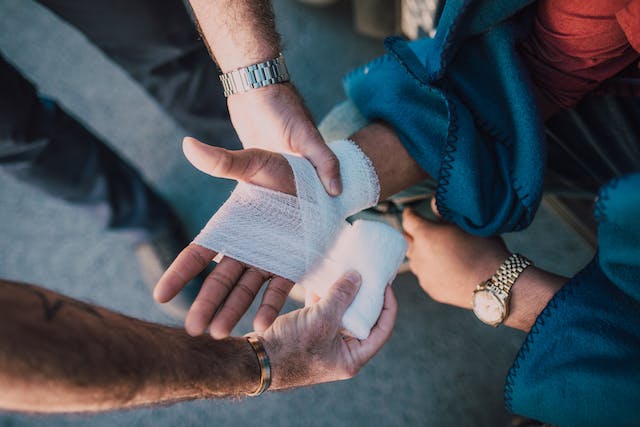
Facing a major injury can be a challenging and overwhelming experience. Managing the psychological and physical effects calls for a calculated strategy. With the guidance of this 5-step approach, you may restore control over your life and successfully navigate the rehabilitation process. Through consistent self-care, support from healthcare professionals, and a resilient mindset, you can not only overcome the hurdles of recovery but also emerge stronger, equipped with the tools and strategies to rebuild your life after a major injury.
1. Seek Professional Medical Guidance
Seeking professional medical guidance is the first crucial step toward recovery when dealing with an injury. Consulting with a healthcare professional, such as a physician, orthopedic specialist, or physical therapist, allows for a comprehensive evaluation of the injury’s severity and the formulation of an effective treatment plan. Professionals can provide insights into the specific nature of the injury, recommend appropriate diagnostic tests, and outline a tailored approach for rehabilitation. This guidance ensures that the recovery process is initiated with a clear understanding of the injury’s nuances, leading to more targeted and effective interventions. In addition to maximizing healing, adhering to the appropriate therapy regimen and treatment plan will reduce the likelihood of long-term problems.
2. Build a Support System
Developing a solid support network is essential to overcoming the obstacles associated with injury rehabilitation. Enlist the support of friends, family, and healthcare professionals to create a network that understands and empathizes with your journey. Communicate openly about your feelings, concerns, and progress, as this not only strengthens emotional well-being but also ensures that those around you are informed and can provide the necessary support. Friends and family can offer encouragement, assistance with daily tasks, and companionship, while healthcare professionals contribute expertise in guiding your recovery. A robust support system not only eases the emotional burden but also plays a pivotal role in enhancing overall well-being during the healing process.
3. Adapt Your Lifestyle
Adapting your lifestyle is a crucial aspect of injury recovery. Embrace necessary adjustments to your daily routine to accommodate your injury and promote healing. This might involve modifying your work schedule, incorporating assistive devices, or making changes to your living space for better accessibility. Additionally, consider exploring alternative activities that align with your current capabilities and don’t exacerbate your injury. Being receptive to these modifications promotes healing and aids in avoiding more stress or issues. Work closely with healthcare professionals, such as physical therapists or occupational therapists, to identify specific lifestyle modifications that support your recovery journey.
4. Follow a Rehabilitation Plan
Following a comprehensive rehabilitation plan is integral to your recovery journey. Create a customized rehabilitation program with medical doctors and physical therapists that considers your unique situation. This plan may encompass targeted exercises, stretching routines, and progressive challenges to regain strength and flexibility. Consistent adherence to your rehabilitation regimen is key to achieving optimal results. Regular evaluations with your healthcare team ensure adjustments to the plan as needed, guiding you through each phase of recovery and helping you regain functionality safely and effectively. Additionally, maintaining open communication with your healthcare team allows you to discuss any challenges or concerns you may encounter during the rehabilitation process, ensuring a supportive and adaptable approach to your recovery. Celebrate small victories along the way, as these milestones not only mark progress but also serve as motivation to stay committed to your rehabilitation journey and achieve long-term well-being.
5. Consider Legal Guidance
In cases where the injury results from another party’s negligence, legal guidance is crucial. Speaking with a personal injury attorney may be very helpful as they have the knowledge to evaluate your case thoroughly. These legal professionals guide you through potential legal avenues, ensuring that you are aware of your rights and options. They are essential in assisting you in your quest for payment for lost income, medical bills, rehabilitation expenditures, and other losses brought on by the accident. Collaborating with a personal injury lawyer provides valuable support and advocacy, especially when navigating the complexities of the legal system. If you’re in the Lakeland, FL area, seeking a reputable personal injury lawyer in Lakeland, FL, can significantly enhance your ability to secure a fair and just outcome.
Conclusion
Managing a significant injury necessitates a thorough strategy that takes care of the mental and physical components. By following this 5-step guide, you empower yourself to navigate the challenges of recovery and pave the way for a smoother healing journey. Remember that patience and resilience are essential companions on your recovery journey; by prioritizing both physical rehabilitation and emotional well-being, you lay the foundation for a holistic recovery process that promotes not just healing but also long-term health and vitality.


